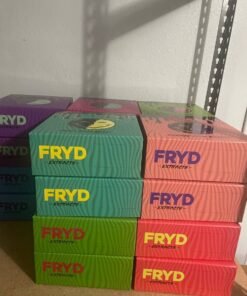THC juice refers to cannabis extracts formulated into a liquid form that is typically used for vaping. It contains tetrahydrocannabinol (THC), the main psychoactive compound in cannabis, and may also contain other cannabinoids and terpenes. THC juice is a popular choice for cannabis users who prefer the convenience and discretion of vaping over smoking, offering a fast-acting and efficient way to experience the effects of THC.
THC juice is similar to e-liquid or e-juice used in vaping, but with the added potency of THC. It’s used in vape pens, vape cartridges, or refillable e-cigarettes. The liquid usually combines cannabis extracts with carrier liquids like vegetable glycerin (VG), propylene glycol (PG), or other safe diluents, making it suitable for use in a vaporizer.
What is THC Juice?
THC juice is essentially liquid cannabis—a concentrate of THC in a vaporizer-friendly liquid form. It is often created by extracting THC from cannabis plants using various methods (like CO2 extraction, butane hash oil (BHO) extraction, or live resin extraction) and then thinning it down with suitable diluents (like VG, PG, or MCT oil) to ensure it can be vaporized effectively.
The juice may contain just THC or a mix of other cannabinoids such as CBD, CBG, or CBN to create a more balanced or enhanced experience. Some products are also infused with terpenes, which are aromatic compounds in cannabis that influence flavor and effects.
How is THC Juice Made?
The process of creating THC juice involves extracting cannabinoids from the cannabis plant and then blending them into a liquid form that is compatible with vaporizers.
1. Cannabis Extraction
- CO2 Extraction: One of the cleanest and most efficient methods, where carbon dioxide is used to extract THC and other cannabinoids from the cannabis plant. This method preserves the natural terpene profile and results in a clean, potent concentrate.
- Butane Hash Oil (BHO) Extraction: A solvent-based extraction method that uses butane to extract THC and other cannabinoids from the plant. This method produces a high-potency concentrate but requires a purging process to remove residual solvents.
- Live Resin Extraction: This method involves flash-freezing freshly harvested cannabis before extracting it with butane or propane. It preserves a larger proportion of terpenes, giving the THC juice a rich flavor and complex effects.
- Solventless Extraction: This process uses no chemicals or solvents, and it involves techniques like rosin pressing, where pressure and heat are used to extract oil from cannabis flowers. The resulting juice may be used in certain high-quality vaping products.
2. Thinning the Extract
- After the THC is extracted, it is typically too thick to be used in a vaporizer directly. To make it suitable for use in vape pens or cartridges, the extract is “thinned” with carrier liquids, which help to dilute the concentrate and make it vaporize effectively. Common thinning agents include:
- Vegetable Glycerin (VG): A common base in e-liquids, VG creates thicker vapor clouds and has a slightly sweet taste.
- Propylene Glycol (PG): A thinner liquid that enhances the throat hit, PG also serves as a carrier for flavorings and terpenes.
- Medium-Chain Triglyceride (MCT) Oil: Often used in tinctures, MCT oil can also be used in THC vape juice. It’s derived from coconut oil and is popular for creating a smoother vapor experience.
3. Flavoring and Terpenes
- Some THC juices are flavored with terpenes to enhance the overall vaping experience. Terpenes are naturally occurring compounds in cannabis that give the plant its distinctive aroma and flavor. Terpene profiles vary widely, with some common ones being citrusy, piney, earthy, or floral. Terpenes can also help guide the effects of the THC juice, such as providing more relaxing, energizing, or uplifting sensations.
How to Use THC Juice
THC juice is primarily designed for use in vape pens, vape cartridges, or refillable e-cigarettes. Here’s a step-by-step guide on how to use THC juice:
1. Vape Pens
- Disposable Pens: These pens come pre-filled with THC juice and are ready to use immediately. Simply inhale to activate the vaporizer. Once the pen runs out of juice, it is discarded.
- Refillable Pens: These pens allow you to add your own THC juice to a refillable cartridge or tank. After refilling, attach the cartridge to the pen and begin vaping.
2. Vape Cartridges
- Vape cartridges are pre-filled containers of THC juice that screw onto a compatible battery. They are available in different THC concentrations, so you can choose one that suits your needs.
3. E-Cigarettes
- While most e-cigarettes are designed for nicotine-based liquids, some are compatible with THC juice. Be sure to check the compatibility before using THC juice in an e-cigarette device.
Types of THC Juice
There are several variations of THC juice based on its extraction method, potency, and added ingredients:
1. THC Distillate Juice
- Description: Distillate is a highly purified cannabis extract that is refined to contain only THC, with little to no remaining plant matter or other cannabinoids.
- Potency: THC distillate juice is often highly concentrated (typically 85%-95% THC), making it a potent option for users seeking strong effects.
- Flavor: Because distillate is flavorless and odorless, manufacturers often add terpenes to the juice to improve the taste and effects.
2. Full-Spectrum THC Juice
- Description: Full-spectrum THC juice is made from cannabis extracts that retain a wide range of cannabinoids, terpenes, and flavonoids from the plant.
- Potency: It offers a broader cannabinoid profile than distillate, which may provide a more balanced experience. The THC content typically ranges from 60%-85%.
- Flavor: Full-spectrum extracts tend to have more robust, plant-like flavors due to the presence of terpenes and other compounds from the cannabis plant.
3. Live Resin THC Juice
- Description: Live resin is made from freshly frozen cannabis, preserving its terpene profile, and is used to create THC juice with a more flavorful and aromatic experience.
- Potency: Live resin THC juice is potent, generally ranging between 65%-90% THC.
- Flavor: Known for its rich, complex flavor profiles due to the preservation of terpenes.
4. THC Isolate Juice
- Description: THC isolate juice is made from THC isolate, which is the purest form of THC (almost 100% THC), without any other cannabinoids or terpenes.
- Potency: THC isolate is very potent and generally does not include the entourage effect that full-spectrum products provide.
- Flavor: This juice has a neutral or mild flavor, often requiring the addition of terpenes for enhanced taste.
Benefits of THC Juice
THC juice offers several advantages, particularly for users who prefer vaping as a method of cannabis consumption:
1. Fast-Acting Effects
- Vaping allows THC to enter the bloodstream almost immediately through the lungs, leading to quick effects, often within minutes. This is ideal for people who want rapid relief or a fast onset of effects.
2. Discreet and Portable
- Vaping THC juice is a discreet way to consume cannabis. The vapor dissipates quickly, and there is little odor, making it easy to use without attracting attention. It is also portable, as vape pens and cartridges are compact and easy to carry.
3. Precise Dosing
- Vape pens and cartridges provide consistent doses, allowing users to more easily control their THC intake. This makes it easier to avoid overconsumption, as each puff delivers a known amount of THC.
4. Customizable Experience
- THC juice can be customized with various terpenes to enhance the flavor and effects. Whether you prefer a relaxing, uplifting, or euphoric experience, you can find juice formulations that cater to your desired outcome.
Risks and Side Effects of THC Juice
As with any cannabis product, THC juice carries certain risks and potential side effects, especially when consumed in excess:
1. Respiratory Issues
- Vaping can cause irritation to the lungs and airways, leading to symptoms such as coughing or dry throat. Long-term use of vapes, especially with poor-quality products, may lead to respiratory issues.
2. Overconsumption
- THC juice is often highly concentrated, so it’s easy to consume too much. Overconsumption can lead to anxiety, paranoia, dizziness, and increased heart rate.
3. Potential Contaminants
- Low-quality THC juices can contain harmful additives, such as cutting agents (e.g., Vitamin E acetate) or chemical residues from the extraction process. Always buy from reputable sources to ensure safety.
4. Dependency
- Frequent use of high-THC products like THC juice can lead to tolerance and, in some cases, dependence.
Conclusion
THC juice offers a convenient, discreet, and potent method of consuming cannabis, particularly for those who enjoy vaping. With a variety of options available, including distillates, live resin, and full-spectrum extracts, users can find a THC juice that suits their preferences in terms of flavor, effects, and potency.
While THC juice provides rapid onset of effects, it’s important to use it responsibly to avoid adverse side effects such as overconsumption or respiratory irritation. Always ensure you’re purchasing from a trusted source to guarantee product safety and quality.



